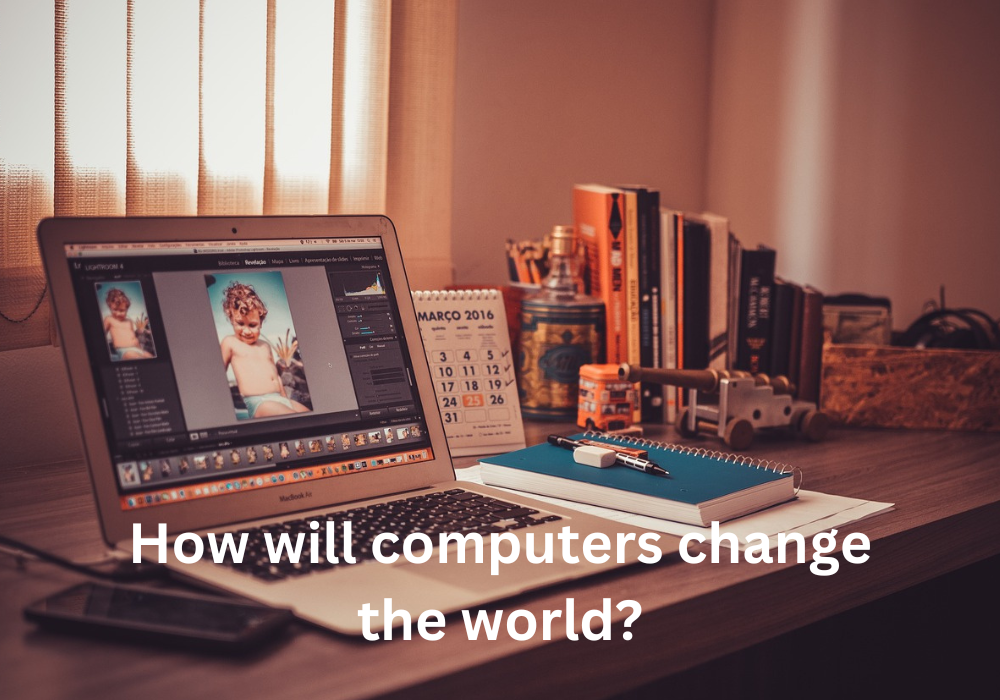I will discuss “How will computers change the world?” in this blog post. Future developments in information technology (IT) and artificial intelligence (AI) will likely cause a dramatic transformation in how people interact with computers.
How will computers change the world?
Computers in Healthcare
Healthcare is transforming thanks to artificial intelligence (AI) and machine learning (ML), which improve patient outcomes and expedite procedures. The following are some salient points:
Enhancing Results for Patients:
Machine learning algorithms may process real-time data from wearable technologies swiftly, facilitating more efficient data collecting and individualized care.
Medical record organization, medical imaging and diagnostics, medication discovery, and illness prediction and treatment all utilize AI and ML.
Simplifying Medical Procedures:
Healthcare professionals may concentrate on critical tasks using machine learning (ML) algorithms to automate processes, schedule appointments, and search electronic health records (EHRs) for particular patient data.
AI is used in healthcare administration, patient engagement, adherence, diagnosis, and therapy recommendations.
AI/ML in Healthcare Examples:
In healthcare, companies such as IBM, Pfizer, and Microsoft use machine learning for patient-doctor matching, medical imaging improvement, and drug development.
Machine learning algorithms that can forecast patients’ reactions to certain medications make proactive patient care possible.
Difficulties and Ethical Issues:
One of the challenges is in guaranteeing the integration of AI technologies into clinical practice.
Preserving one’s privacy. Addressing issues of ethics. Appropriately interpreting the outcomes.
Care must be taken to address ethical concerns, including algorithmic bias and the disappearance of the human element in healthcare.
Prospects for the Future:
Researchers anticipate that AI will be essential to advancing precision medicine and enhancing healthcare standards.
The extensive use of AI in clinical practice may take some time owing to regulatory approval procedures, even though it will complement human physicians’ efforts rather than completely replace them.
Computers in Business
E-commerce has completely transformed the global retail sector, offering unprecedented opportunities for companies of all kinds. Principal advantages consist of:
Less need for physical locations and inventory management increases efficiency and lowers operating expenses.
Increased worldwide reach, drawing clients from all over the world.
Updated user interface and a better, round-the-clock consumer experience.
However, data security issues and cybersecurity risks continue to be serious obstacles.
Online Advertising
Traditional modes of advertising have been supplanted by digital marketing, which increases ROIs and conversion rates. Benefits consist of:
Campaigns that are specifically aimed at certain audiences.
Monitoring and optimizing marketing campaigns in real time.
Increased adaptability and nimbleness in comparison to traditional marketing strategies.
However, staying on top of rapidly evolving technology and customer tastes is still difficult.
Cloud Computing
Utilizing scalable IT solutions is made possible for organizations via cloud computing, which leads to the following:
Shorter capital expenditure periods and quicker deployment timelines.
Enhanced backup and disaster recovery capabilities.
Improved coordination and output amongst geographically separated teams.
Although cloud computing has many advantages, maintaining complex multi-cloud setups and protecting sensitive data are constant difficulties.
The Future of Computers
The future of computers is full of fascinating new possibilities and industry-changing effects. Among the noteworthy developments and trends are:
Both machine learning and artificial intelligence
Innovation in autonomous systems, image recognition, and natural language processing will continue to be fueled by AI and ML.
Experts anticipate that quantum computing will significantly advance AI and ML capabilities, enabling the creation of more powerful and intelligent gadgets.
Augmented and Virtual Reality
The adoption of VR and AR technologies in personal computers will increase, improving user experiences and broadening their potential applications.
Edge computing, IoT, and blockchain
While IoT will incorporate many sensors and devices, blockchain technology will enable safe and decentralized data exchange.
By moving processing closer to the data source, edge computing will lower latency and boost system performance.
Quantum Computing
With its ability to solve intricate puzzles that traditional computers cannot solve, quantum computers will pave the way for new developments in science, engineering, and business.
Optical Computing
By processing data using light rather than electrons, optical computing seeks to address the problem of heat dissipation and increase energy efficiency.
Neuromorphic Computing
To develop computer systems that are more effective and adaptable, neuromorphic computing attempts to mimic the composition and operation of the human brain.
These developments will shape The future of computing, providing both new possibilities and difficulties. As always, careful usage and regulation will be essential to optimizing these technologies’ positive effects while reducing dangers and adverse effects.
How will computers change the world?- Conclusion
This blog series examined how computers may change lives, emphasizing how they affect communication, business, healthcare, education, and entertainment. We explored the history of computers, their impact on education, the utilization of AI and ML in healthcare, and the influence of cloud computing, e-commerce, and digital marketing on organizations. Lastly, we discussed the difficulties and moral dilemmas posed by the continuous development of computers and future developments.
Computers have undoubtedly altered the world, and their impact is only increasing. Individuals and organizations may help shape a better future with computers at its center by embracing technical improvements and remaining updated about changes in computer technology. To ensure that computers benefit mankind ethically and inclusively, it is crucial to strike a balance between the quest for development and responsibility.
The future of computers is hopeful, full of ground-breaking discoveries and inventive innovations. But it’s also critical to recognize the obligations and difficulties these developments bring. Careful and thoughtful use of computers has the potential to enhance our lives and make the world a better place.

